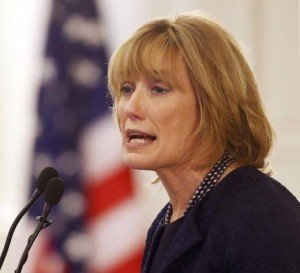
Charitable Poker Tournaments Draw Scrutiny in New Hampshire

New Hampshire Governor Maggie Hassan recently signed an amendment to the charitable poker law and its significance has been immediately felt as revenues have soared, calling into question its legality.
One might assume charitable poker wouldn’t be controversial in nature as its primary goal is to raise money for non-profits, but a recent law passed in New Hampshire has transformed the philanthropic fundraising into big business for not only the charities but also operators organizing the events.
House Bill 169, signed by Governor Maggie Hassan in late June, amended the state’s Games, Amusements, and Athletic Exhibitions law by removing the $4 per hand single wager limit from charitable poker tournaments in favor of imposing a $150 buy-in cap.
“The amount wagered by a player during the play of a hand shall not be limited,” the bill reads. “In any such ‘table stakes’ game, the amount of chips a player may purchase during the course of play in said game shall be no greater in value than $150.”
However, charities and facilitators are reportedly allowing re-buys, sometimes as many as five times for a total of $750. That has led to higher revenues for the beneficiaries, but also concerns from lawmakers who believe such high-stakes games voids the charity component of the events.
More Revenue, More Concerns
The River Card Room in Milford, New Hampshire, is one charitable casino that has seen its revenues catapult as a result of HB 169. In June, cash poker accounted for less than $2,000, but following the gaming amendment the facility generated $40,000 in July.
“The charities got 35 percent, the state 10 percent, and a lot more dealers have jobs,” Rick Newman, a River Card Room representative told the Union Leader, a daily newspaper in Manchester.
An increase in funding to charities and the state’s tax revenue system is unquestionably welcomed, as are additional jobs, but Newman’s own quote highlights the problem with charitable gaming in that 65 percent of the monies paid to the house are going into the pockets of someone other than the supposed non-profit benefactor.
State Representative Patrick Abrami (R-District 19) said the new law’s impact has taken poker in New Hampshire “out of the realm of charitable gaming into real gambling.”
What’s the Allure?
Poker players unfamiliar with charitable tournaments might wonder why someone would be enticed to routinely donate part of their buy-in to charity. First and foremost, until the MGM Springfield and Wynn Everett open in Massachusetts, the primary reason Live Free or Die residents play charity poker is for convenience.
Another leading cause is that the poker fees are partially tax-deductible assuming the charity is a registered 501(c)(3) exempt entity. Finally, only a percentage of the entry goes to charity, with the rest being deposited into the prize pool and ongoing promotions.
Players who previously traveled south to Connecticut’s Foxwoods or Mohegan Sun casinos are now thought to be staying in New Hampshire, and while keeping the money in the state is a positive, the law could be reexamined during Wednesday’s Racing and Charitable Gaming Commission meeting.
Commission Chairman Timothy Connors said it’s “quite a bonanza for the charities right now,” but added his committee will address the situation on September 9th. However, he hinted to the Union Leader any changes would not be extensive.















0 Comments